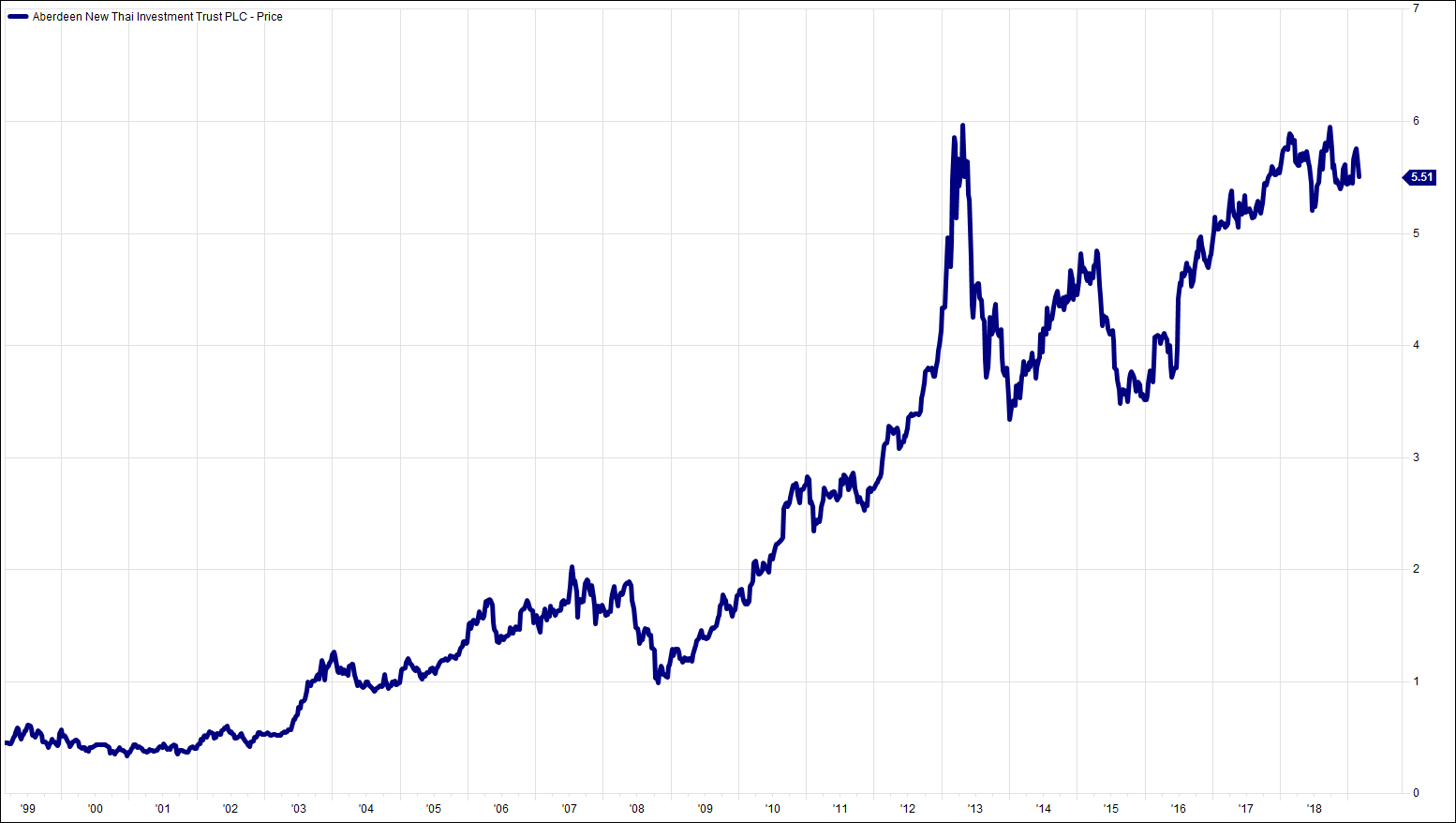
We need to start the week with an apology. This is the only Innovation of March. Your current respondent is, with quite unfortunate timing, disappearing to the other side of the world while everyone else deals with you-know-what, Hammond’s Spring Statement, the US-China trade deal and England’s win in the Six Nations.
The quid pro quo is that I am due to be flying back the day after Thailand’s first general election since February 2014. I believe the common term these days to express disbelief in a supposition is along the lines of “yeah, right”. It is slightly over ten years since my journey back from Bangkok took a week (with an unconventional route via KL and Hong Kong); it is quite within the realms of possibility that the next Innovation comes from an airport lounge a long, long way away.
It is counterintuitive that a country with such a consistent record of political instability has been so widely cited as being the only investment trust that could have created an ISA millionaire. According to the AIC, should you have been so insanely naïve as to have invested your maximum ISA allowances over the past twenty years solely into Aberdeen New Thai Investment Trust, you would now have over a million quid’s worth of tax-free lolly.
The maths are that you could have invested a total of £206,560 from 1999 to 2018, and that this would now be worth a magnificent £1,070,583. Wow.
Except, of course, the only way that you could have done this would have been to be in a cocoon for twenty years. Everyone falls foul of the short-term. Thailand had four prime ministers in 2008 alone, a political roundabout to test the stoutest resolve. There were tanks parked at the end of my road in 2006 and 2014. The price of Aberdeen New Thai rose six-fold in five years between 2008 and 2013. And then almost halved in nine months. Any of these, surely, would have made the sane and rational investor sell up and run away to something ‘safer’.
As an industry, we have a myopic view of risk. Everything that we all have to do to assess and control risk is about trying to stop things from going wrong. But how often do we assess, measure or quantify the risk of something going right? We shy away from volatile assets. The cost of this is the sacrifice of gains.
Why is it that so many invest like a wildebeest afraid of a lion? It is as if investment changes human nature from that of the hunter-gatherer to being a timid herbivore, whose primary aim is to avoid being breakfast.
We all have to fight against the instinct to do the wrong thing. That is why we have maximum and minimum limits on our asset allocations. It is natural to want to follow the herd. If everyone else is buying (or selling), then that is what appears to be the right thing to do. Investors are most ‘bullish’ about things that they actually own, not what they think they ought to. It is thus the way the universe was made that investors are most bullish after everyone has bought – a market top – and most miserable at the bottom.
Collars and caps are a proven way to avoid this. They stop you buying high and selling low. Moreover if you apply the disciplines in a disciplined way, they make you sell into the peaks and buy into the troughs. That is how it should be.
Too many still equate ‘risk’ with historic volatility. If the price has gone down, chances are the security or asset has become more ‘volatile’ and your idiotic textbook will tell you to sell it. Where is the logic that says it is right to sell assets that are likely to be cheap in favour of those probably more expensive? I hope you will excuse the reference, but it really is a mixed up, muddled up, shook up world.
This week’s big market event should come on Friday, which is non-farm payrolls day. Lunchtime reveals the number of jobs created during February, and arguably more importantly, how much everyone is now getting paid. The markets are going to give the Fed another test soon. If these numbers strengthen, then how long will the Fed stick with its dovishness? But without that strength, then surely the US economy has peaked? It is only a matter of time until teddy is chucked out of the pram again.
We seemed to strike the right chord last week with Nellie the Elephant. Today, a fun one to last until April Fools Day: what is the theory, according to mailman Cliff Clavin, that explains why drinking beer makes one more intelligent?
Chart of the Week:
Aberdeen New Thai Investment Trust. The ISA years, from 1999.

HA804/207
All charts and data sourced from FactSet
Jim Wood-Smith – CIO Private Clients & Head of Research

Hawksmoor Investment Management Limited is authorised & regulated by the Financial Conduct Authority (www.fca.org.uk). This document is issued by Hawksmoor Investm.ent Management Limited (“Hawksmoor”) whose registered office is at 2nd Floor Stratus House, Emperor Way, Exeter Business Park, Exeter, Devon EX1 3QS. This document does not constitute an offer or invitation to any person in respect of any investments described, nor should its content be interpreted as investment or tax advice for which, if you are an individual, you should consult your independent financial adviser and or accountant. The information and opinions it contains have been compiled or arrived at from sources believed to be reliable at the time and are given in good faith, but no representation is made as to their accuracy, completeness or correctness. Hawksmoor, its directors, officers, employees and their associates may have a holding in any investments described. The editorial content is the personal opinion of Jim Wood-Smith, Head of Research. Other opinions expressed in this document, whether in general or both on the performance of individual securities and in a wider economic context, represents the views of Hawksmoor at the time of preparation. They are subject to change. Past performance is not a guide to future performance. The value of an investment and any income from it can fall as well as rise as a result of market and currency fluctuations. You may not get back the amount you originally invested. With regard to any of the Hawksmoor’s managed Funds, please read the prospectus and Key Investor Information Document (“KIID”) before making an investment.
